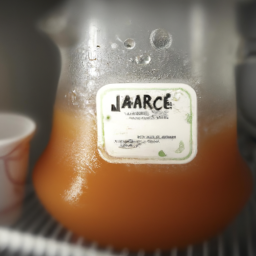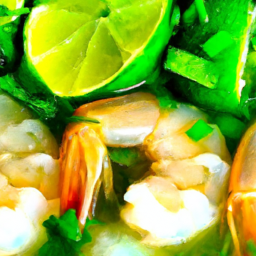They say that breakfast is the most important meal of the day, and for me, there’s nothing better than beginning my morning with a refreshing glass of orange juice.
But as someone who likes to stock up on groceries, I often find myself wondering how long I can keep orange juice in the fridge before it goes bad. After all, no one wants to take a sip of sour and stale juice.
So, I did some research and found that the shelf life of orange juice largely depends on whether it’s freshly squeezed or store-bought, the processing method used, and the storage conditions.
In this article, I’ll be sharing my findings on how long orange juice can last in the fridge, the signs to look out for when it’s gone bad, and some tips on how to extend its shelf life.
So, grab a glass of OJ, and let’s dive in!
Key Takeaways
- The shelf life of orange juice depends on packaging, processing method, and storage conditions.
- Freshly squeezed orange juice can last up to two weeks in the fridge without preservatives, while store-bought orange juice lasts longer due to preservatives.
- Proper container type, refrigeration, and consumption timeframe can extend orange juice shelf life. Glass containers preserve flavor but are heavy and breakable, plastic containers are lightweight but can leach chemicals and absorb flavors, and Tetra-pak containers are light-proof and airtight but non-recyclable and difficult to pour.
- Orange juice is a great source of essential nutrients and antioxidants that can improve overall health and reduce the risk of chronic diseases. It’s recommended to include orange juice in your daily diet to reap the benefits of its antioxidants.
The Factors that Affect the Shelf Life of Orange Juice
You’re probably wondering how long your orange juice will last in the fridge, and the answer depends on several factors that you might not have considered.
One of the most critical factors is the packaging method used, as it determines how much oxygen the juice is exposed to. Oxygen is one of the main culprits that causes spoilage in orange juice, as it triggers the growth of bacteria and other microorganisms.
Therefore, it’s essential to choose packaging that minimizes the amount of air in contact with the juice, such as vacuum-sealed containers or airtight bottles.
Another factor that can affect the shelf life of orange juice is temperature control. Orange juice should be stored in the fridge, as it slows down the growth of microorganisms and helps preserve the flavor and quality of the juice.
However, even within the fridge, the temperature can vary depending on where the juice is stored. For example, if the juice is placed in the door, it may be exposed to more temperature fluctuations due to the door opening and closing frequently.
Therefore, it’s best to store orange juice in the main compartment of the fridge, where the temperature is more consistent.
With proper packaging and temperature control, orange juice can last for up to a week or more in the fridge.
Now, let’s move on to the next section and explore how long freshly squeezed orange juice can last in the fridge.
How Long Can Freshly Squeezed Orange Juice Last in the Fridge?
Freshly squeezed orange juice can stay fresh in a refrigerator for up to two weeks because it does not contain any preservatives that prolong its shelf life. However, the shelf life of homemade orange juice can vary depending on factors such as the juicing method used, the type of oranges used, and the storage conditions.
To ensure that homemade orange juice lasts for the full two weeks, it’s important to use a juicing method that minimizes oxidation, such as a masticating juicer. Additionally, it’s recommended to use fresh, organic oranges that haven’t been treated with any chemicals. Finally, the juice should be stored in an airtight container in the refrigerator, away from any heat sources.
Moving on to the next section, store-bought orange juice typically contains preservatives that extend its shelf life beyond that of freshly squeezed juice. However, the shelf life of store-bought orange juice can still vary depending on factors such as the type of preservatives used and the storage conditions.
How Long Can Store-Bought Orange Juice Last in the Fridge?
When you grab a carton of store-bought OJ from the fridge, envision the convenience of having it on hand for impromptu mimosas or a quick breakfast on-the-go without worrying about how soon it might spoil. Store-bought orange juice typically lasts longer than freshly squeezed juice due to the addition of preservatives. The nutritional value of store-bought orange juice may vary depending on the brand and type of juice.
To give you an idea of how long store-bought orange juice lasts in the fridge, I’ve created the following table:
| Type of Orange Juice | Refrigerator Shelf Life |
|---|---|
| Unopened, shelf-stable carton | Up to 1 year |
| Refrigerated carton (unopened) | Around 1 week past expiration date |
| Freshly squeezed refrigerated carton (unopened) | Around 4-7 days past expiration date |
| Opened carton | Around 7-10 days |
It’s important to note that while store-bought orange juice may last longer due to preservatives, it’s still important to check for signs of spoilage before consuming. In the next section, I’ll discuss some signs to look out for to determine if your orange juice has gone bad.
Signs that Orange Juice Has Gone Bad
If your carton of OJ has developed a sour smell or taste, it’s a clear indication that it’s gone bad and should be discarded. Another sign that orange juice has gone bad is if you notice any mold or discoloration on the surface of the juice.
As a general rule, orange juice should be consumed within 7-10 days of being opened and stored in the refrigerator. However, there are ways to repurpose bad orange juice instead of throwing it away.
One way to repurpose bad orange juice is to use it as a marinade for meats or fish. The acidity in the juice can help tenderize the meat and add a citrusy flavor. Another option is to use it in smoothies or cocktails as a substitute for fresh orange juice. By using these methods, you can still make use of the orange juice even if it’s no longer suitable for drinking.
As you can see, there are ways to repurpose bad orange juice, but it’s always best to avoid it from going bad in the first place. To do this, there are certain tips for extending the shelf life of orange juice that you can follow.
Tips for Extending the Shelf Life of Orange Juice
Just like a delicate flower, orange juice needs to be handled with care to ensure it stays fresh for as long as possible. There are various ways to prevent spoilage and extend the shelf life of orange juice. One key factor is the type of container used to store the juice. The table below summarizes the best types of containers for orange juice:
| Container Type | Pros | Cons | Recommended Usage |
|---|---|---|---|
| Glass | Non-reactive, preserves flavor | Heavy, breakable | Short-term storage |
| Plastic | Lightweight, shatterproof | Can leach chemicals, absorbs flavors | Short to mid-term storage |
| Tetra-pak | Light-proof, airtight | Non-recyclable, difficult to pour | Long-term storage |
In addition to the container type, it’s important to keep the orange juice refrigerated at all times and to consume it within a certain timeframe. Generally, fresh orange juice can last up to a week in the fridge if stored properly. However, to extend its shelf life, it’s best to consume it within 2-3 days of opening. With these tips, you can enjoy fresh and delicious orange juice for a longer period of time.
When it comes to storing orange juice in the fridge, there are a few more steps you can take to ensure its freshness.
How to Store Orange Juice in the Fridge
To keep your OJ tasting fresh and delicious, it’s important to know how to properly store it in the refrigerator. Here are a few tips for storing citrus in the fridge and preventing spoilage:
- Store orange juice in a tightly sealed container. This will help prevent air and moisture from getting in and spoiling your juice.
- Keep your OJ in the coldest part of your fridge, which is usually the back of the bottom shelf. This will help it stay fresh for longer.
- Avoid storing orange juice in the door of your fridge, as this area is subject to temperature fluctuations and can cause your juice to spoil more quickly.
By following these simple tips, you can extend the shelf life of your orange juice and enjoy it for longer.
Now, let’s move on to the next topic: how to freeze orange juice.
How to Freeze Orange Juice
Now that we know how to properly store orange juice in the fridge, it’s important to also consider freezing techniques if we want to extend its shelf life. Freezing orange juice is a great way to prevent spoilage and preserve its flavor for a longer period of time.
To freeze orange juice, simply pour it into a clean, airtight container, leaving some room at the top for expansion. Seal the container tightly and label it with the date of freezing so that you can easily keep track of its freshness.
When you’re ready to use the frozen orange juice, transfer it to the fridge and let it thaw slowly overnight. Avoid thawing it at room temperature or in the microwave, as this can cause it to lose its flavor and texture.
Now that we’ve covered how to properly freeze and thaw orange juice, let’s move on to the next step: how to use leftover orange juice.
How to Use Leftover Orange Juice
When life gives you too much OJ, don’t waste it – get creative with your leftover tangy goodness! There are so many ways to cook with leftover orange juice, so don’t let it sit in your fridge until it goes bad. Here are some ideas to get started:
| Recipe | Ingredients |
|---|---|
| Orange Glazed Carrots | Carrots, Orange Juice, Brown Sugar, Butter |
| Orange Chicken | Chicken Breasts, Orange Juice, Soy Sauce, Garlic, Ginger |
| Orange Creamsicle Smoothie | Orange Juice, Greek Yogurt, Vanilla Extract, Honey |
Not only can you use leftover orange juice in your cooking, but there are also many benefits to drinking orange juice every day. It’s high in vitamin C, which can boost your immune system and protect against diseases. Additionally, orange juice contains flavonoids, which can improve heart health and reduce inflammation. So next time you have some leftover orange juice, don’t let it go to waste – use it in your cooking or drink it up for some added health benefits.
Moving on to the health benefits of orange juice, did you know that it can also help with digestion and hydration?
Health Benefits of Orange Juice
I love drinking orange juice, not just because of its delicious taste, but also because of its impressive health benefits.
Firstly, orange juice is rich in Vitamin C, which helps boost the immune system, promote healthy skin, and prevent chronic diseases.
Secondly, orange juice contains other important nutrients such as potassium, magnesium, and folate that are essential for overall health.
Lastly, orange juice is a great source of antioxidants that help protect against oxidative stress and reduce inflammation in the body.
Vitamin C
Orange juice, like other fruit juices, contains Vitamin C, which helps boost your immune system and keep you healthy. But did you know that orange juice also has other benefits beyond just Vitamin C?
Studies have shown that consuming orange juice can also improve skin health and prevent aging. The antioxidants in orange juice help protect your skin from damage caused by free radicals, which are unstable molecules that can harm cells and contribute to wrinkles and other signs of aging.
In addition to Vitamin C and antioxidants, orange juice also contains other important nutrients such as potassium, folate, and thiamine. These nutrients play a vital role in maintaining good health, including regulating blood pressure, promoting healthy fetal development during pregnancy, and supporting the nervous system.
So next time you reach for a glass of orange juice, remember that you’re not just getting a boost of Vitamin C – you’re also getting a variety of other essential nutrients that can help keep you healthy and feeling your best.
Other Nutrients
So, we’ve talked about Vitamin C and its importance in orange juice. But did you know that orange juice also contains other essential nutrients? These Other Nutrients, such as Calcium and Potassium, are also vital for our health and well-being.
Calcium is an essential mineral that is crucial for bone health and development. It also plays a role in blood clotting, muscle function, and nerve transmission.
On the other hand, Potassium is essential for maintaining fluid balance in the body, nerve function, and muscle contraction. These two nutrients, along with Vitamin C, make orange juice a complete package of essential nutrients. In fact, drinking orange juice regularly can provide numerous benefits for our immune system and skin health.
- Drinking orange juice can help improve bone health and development due to its calcium content.
- Orange juice can also help regulate blood pressure and maintain fluid balance in the body due to its potassium content.
- Orange juice is a good source of antioxidants, which can protect our cells from damage and reduce the risk of chronic diseases.
- The high Vitamin C content in orange juice can help boost our immune system and improve our skin health.
- Orange juice is a low-calorie drink that can help us stay hydrated and maintain a healthy weight.
Moving on to the next topic, antioxidants are also an essential component of orange juice.
Antioxidants
Moreover, antioxidants found in orange juice are essential for protecting our cells from damage caused by free radicals. Orange juice is one of the top antioxidant-rich fruits, as it’s rich in vitamin C, flavonoids, and carotenoids.
These antioxidants help to neutralize free radicals in the body that can cause cell damage and increase the risk of chronic diseases such as cancer, heart disease, and Alzheimer’s disease. The benefits of antioxidants for overall health are numerous. They not only help to protect our cells from damage but also support our immune system, reduce inflammation in the body, and improve heart health.
Regular consumption of orange juice, along with other antioxidant-rich fruits and vegetables, can help to improve overall health and reduce the risk of chronic diseases. So, it’s recommended to include orange juice in your daily diet to reap the benefits of its antioxidants.
Frequently Asked Questions
Can I still drink orange juice past its expiration date?
I wouldn’t recommend drinking expired orange juice. However, if it hasn’t gone bad, you can still drink it. To extend its shelf life, keep it refrigerated and consume within a few days. Expired juice may not have the same health benefits as fresh, but it still contains some nutrients.
Is it safe to consume orange juice that has been left out of the fridge for a few hours?
Leaving orange juice out of the fridge for a few hours can increase the potential for bacteria growth and spoilage risks due to acidic reactions. It’s best to consume refrigerated orange juice within a few days of opening.
Can I mix different types of orange juice together and store them in the fridge?
Mixing different types of orange juice together is possible, but it may affect the taste. I’ve tried it before and found that the taste comparison wasn’t as good as keeping them separate.
Will freezing orange juice affect its nutritional value?
Freezing effects on orange juice’s nutritional value are minimal. A taste test shows that frozen orange juice may have a slightly different taste compared to fresh, but overall, the nutrient content remains intact.
How long can orange juice last in a glass container compared to a plastic container?
I’ve found that orange juice stored in glass containers tends to stay fresher longer than in plastic, especially at cooler temperatures. The impact of temperature on freshness is significant, with refrigerated juice lasting up to a week.
Conclusion
In conclusion, knowing how long orange juice can last in the fridge can help you avoid wasting money and reduce your food waste. Freshly squeezed orange juice can last up to five days in the fridge, while store-bought orange juice can last up to two weeks. However, it’s important to keep an eye out for signs of spoilage, such as a sour smell or taste.
To extend the shelf life of your orange juice, store it in an airtight container and keep it at a consistent temperature. You can also freeze leftover orange juice for later use. With its numerous health benefits, including being a good source of vitamin C and antioxidants, orange juice can be a valuable addition to your diet.
In essence, orange juice is like a bright burst of sunshine in a glass, providing nourishment and enjoyment. By taking proper care of it, you can ensure that it remains fresh and delicious for as long as possible.
So, next time you reach for that carton of orange juice, remember these tips to make the most of it.









